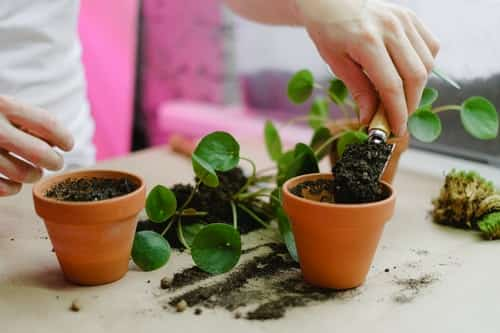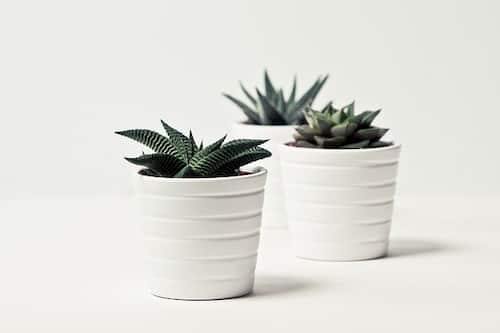While growing plants we are always looking for ways to tackle pest manifestations, fungal infections along a number of other problems. In such instances instead of using harmful chemical pesticides, fertilizers we can explore certain safer and greener options that won’t end up harming our succulents in the long run. So,
Is Hydrogen Peroxide Good for Succulents? Using Hydrogen Peroxide in diluted forms will help in boosting the growth of your succulent enormously. Also, it is great for treating root rots, microbial infections, improving the soil health & stronger root development.
Table of Contents
Is Hydrogen Peroxide Safe for Plants?
- This extra dosage of oxygen helps in boosting the plant health and often times in healing the plant. You may have heard that rainwater is regarded as the ideal water you should be used for watering your plants. Well adding hydrogen peroxide in water helps in resembling the rain to some extent. This is why it is so popular in the field of organic gardening.
- However, you need to be careful regarding what concentration of Hydrogen Peroxide you buy.
- Most commonly it comes in three variations of 3%, 6%, and 35%.
- For growing home plants you should always opt for that 3% concentration and then further dilute it sufficiently with water before applying it to the succulent soil.
The higher concentrations of hydrogen peroxide in undiluted form acts as an excellent weedicide and can be harmful to the plants.
- Many plant buyers prefer to soak their newly bought succulent roots into this mixture for a few hours before planting it in a new soil mix. This is done to revert whatever damage the roots have taken previously during shipping or being kept at the nursery.
- However, this is not a must and is optional. Succulents that are never treated this way also grow up to be just fine.
So to sum up, Hydrogen Peroxide should only be used at low concentrations Around 3% as that is more than enough to get rid of fungal and bacterial growth.
However, even then it should be diluted by many folds with water before use and caution must be taken so that it does not come in direct contact with the skin.
What does Hydrogen Peroxide do for your plants?
Hydrogen Peroxide is an excellent supplement of oxygen for your plants. It acts as an oxygen supplement and naturally boosts the plant’s health by acting as a tonic. The extra oxygen atom in hydrogen peroxide is quite unstable and hence breaks down easily which then further helps in rejuvenating the plant and soil health (source).
Pros of using Hydrogen Peroxide for succulents
Helps in Treating Root Rot
Root rot is the most common reason behind the untimely death of most succulents. These xerophytes are extremely sensitive to overwatering as their roots do not like to stay under damp soil conditions for long as it easily catches root rot.
- Watering succulents once every few weeks with hydrogen peroxide helps in treating this issue as the extra dosage of oxygen is oftentimes found to treat root rot if it’s in the primary stages and has not yet spread to other plant parts.
In certain scenarios, you should cut and trim off all the affected roots to further enhance the succulent”s chances of overcoming the root rot. Then you can keep the roots immersed in a diluted hydrogen peroxide solution.

- Mix 2 teaspoons of hydrogen peroxide(preferably of 3% concentration) to about 1 liter of water and keep the succulent roots immersed in it for about 4 to 6 hours.
- After that, you can repot them in a new potting mix. This will give you succulent a fighting chance to survive. Read this post for more info on this: 6 Signs of Root Rot in your Succulents(& their solutions)
Acts as a Tonic for the Plant health
Hydrogen peroxide helps in not only healing any kind of infection on the plant but also encourages better root development.
The extra bit of oxygen supply boosts the root health and as a result, the roots end up absorbing nutrients in a better way from the soil. This greater uptake of nutrition is directly related to the faster growth of the succulent.
- You can do this maybe once in 4-5 weeks.
- In case you succulent is looking dull and you are not sure why it has suddenly lost its vibrancy, you can try watering the plant with hydrogen peroxide to boost its health instantly.
In certain situations, you can use hydrogen peroxide multiple times a month, firstly making sure that you are only watering when the soil is completely dry. You can use a moisture meter to check the soil moisture.
If even after that the plant does not recover, take a look at your watering routine to see if you are overwatering the plant or not.
Restores the health of the soil
- Hydrogen peroxide helps in getting rid of the harmful bacterial or fungal growth in the soil.
- Adding Hydrogen peroxide can be particularly beneficial if your soil is not too much aeration friendly. This extra supply of oxygen in the soil will help in readily bringing the soil somewhat back to life.
This is not a long term solution in case your soil is not too airy or drainage friendly as the proper solution is to change the composition of the soil mix or to use a new soil mix entirely. But watering the soil with hydrogen peroxide can act as a temporary boost for soil health especially around the succulent roots.
- Hydrogen Peroxide is also believed to help in flushing out the excess salt and mineral buildup in the soil which can be pretty harmful to succulent growth. In case you use tap water for watering your succulents, it’s quite natural that with time the soil will become alkaline.
Tap water contains chlorine, fluoride, chloramine, and a variety of other salts depending upon where you live which is totally unnecessary for succulent growth. So the accumulation of this in the soil can in turn lead to root burning. Using Hydrogen Peroxide helps a lot in neutralizing the damage.
Helps in killing any kind of infection present in the succulent body
Hydrogen peroxide is a well known natural pesticide that takes care of fungal infections as well as common pests that troubles succulents. They also help in getting rid of fungal gnat larvae present in the soil. For more read this post on, How to Get Rid of Flies & Gnats in Potted Succulent Plants?
Helps in fertilizing the succulents and in giving them a rain-like feel
The best way to make any plant thrive is to provide them with conditions that mimic their original habitat. In their natural growing conditions, the only source of water for the succulents is the rain.
- The rain is slightly acidic in nature due to the presence of hydrogen peroxide and this is just perfect for the succulents as they prefer slightly acidic soil pH.
- So watering the succulents with hydrogen peroxide from time to time resembles the rain-like effect and helps in fertilizing the succulent without adding any kind of chemical fertilizer.
Keeps Pest away
Hydrogen Peroxide acts as a natural insecticide and it heavily repels almost the majority of the pests including aphids, bugs, etc. It will kill the larval eggs in the soil and will protect your plant from the pest manifestation in the future. As per Backyardboss, a 1% hydrogen peroxide solution is just perfect for this.
The bonus advantage is you can even use hydrogen peroxide as a disinfectant
You should always disinfect gardening tools after use. Otherwise, an infection can spread from one plant to another.
So every time you trim or cut your succulent roots and stems you can just dip them in a solution made of hydrogen peroxide and it will be alright to again be used for other purposes.
How much water do you mix with hydrogen peroxide?
- In case you are looking to boost the succulent and soil health, you can use Hydrogen Peroxide of 3% concentration and mix 2 teaspoons of the supplement with 1 liter of water.
- If you have fungal infections developing at the leafier upper part of the plant, you can mix 4 tablespoons of 3% Hydrogen Peroxide with 1 liter of water and then spray it on the affected areas.
- If you have root rot developing then you can mix one part of 3% hydrogen peroxide with 2 parts of water and then water the succulent around the stem base and dont stop till water oozes out of the drainage holes.
- You can use hydrogen peroxide for killing weeds. You should directly add hydrogen peroxide of 10% concentration on the weeds. You should do this in the evening or night for better results. The sun won’t be there to break the H2O2 down readily so this will make this process highly effective.
However, you should only add H2O2 directly if the weeds are not growing in your plant pots or anywhere near them. Otherwise, this will affect their health as well, and make sure you take caution so that it does not come in direct contact with your body (source).
Things to Keep in mind while using Hydrogen Peroxide
- Always try using lower concentrations of hydrogen peroxide and dilute it several folds with water before use. This is mandatory in case you dont wanna end up harming your succulents. Too much of a good thing can do more harm than good.
- In case your skin is quite sensitive or you are using hydrogen peroxide above 10% for disinfecting pots and scissors, use rubber waterproof gloves as it can burn the skin. Never use hydrogen peroxide of this high concentration for your succulents. It will end up burning the succulent tissues (source).
- Even though Hydrogen Peroxide is highly beneficial for growing succulents, you must take caution and never try to heat water containing H2O2 under any circumstances. It can lead to explosions (source).
- Always store it in a proper airtight bottle under a cool and dark place away from sunlight.
- If you have pets in the house or small children keep hydrogen peroxide out of their reach. Even though it is used for medical purposes it should never ever be consumed. So take caution on this part.
FAQ
How long does peroxide last in water?
Does hydrogen peroxide kill bugs and ants?
Conclusion
Hydrogen Peroxide when used in optimized amounts with the right measures can transform the health of your succulents and other houseplants within a short time.
Using H2O2 will help in boosting the overall succulent health and in protecting it from pest and infection issues. Also as it flushes out harmful toxins from the soil, the roots will develop to be much stronger.
So will you use hydrogen peroxide for your succulents? Let me know in the comments!
Also Read:
